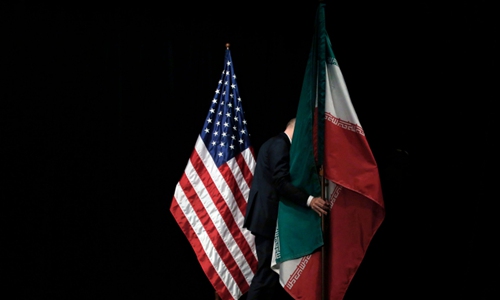HOME >> OPINION
Eliminating Soleimani an attempt to contain Iran
Source:Global Times Published: 2020/1/6 18:58:40

File photo: Xinhua
Iran said Sunday it would no longer abide by any of the limits set by the nuclear deal after the US drone attack that killed Iranian Major-General Qassem Soleimani, head of the Quds Force. The attack is not just another strike on a senior military figure belonging to a Washington adversary; it shows the US unrelenting proclivity to get more involved in the Middle East that counts a lot on the White House's foreign policy.The Trump administration has decided to make its presence thinner in the Middle East, but Soleimani's assassination shows that its deeply entrenched stake in the region makes it difficult for Washington to withdraw.
US President Donald Trump didn't follow his predecessor Barack Obama's road map, which maintained a relative balance in the region, but outlined Iran as a threat, so as to squeeze more profits by means such as arms sales to Gulf countries and the "deal of the century" with Israel to resolve the Israeli-Palestinian conflict. By attracting the world's attention to Iran, the US could have more space for its plans.
Besides, Washington also uses sanctions on Iran as a tool of its "long-arm jurisdiction" to contain countries including China with respect to energy cooperation.
The US has waged two wars against Iraq, but the current situation in Iraq is not what Washington wishes. It doesn't want to see Iran take over its sphere of influence in the region and control Iraq as a result of US military withdrawal. Therefore, eliminating Soleimani is an important move by the US to impair Iran's influence in the Middle East before it pulls out.
Washington wants to withdraw from the region under the condition that the regional situation can be under its control. There would be domestic opposition if the US pulls out and lets other countries take over. Take what happened in Syria - Turkey entered after the US left, Washington had to symbolically put some more efforts in Syria again.
Military withdrawal from Iraq is no exception. The Shia domination in Iraq has been related to Iran. Hence, the US won't completely pull out even it wants to. If Iran gains more influence in Iraq, it could further influence the development of other countries in the region, including Syria. This is not what the US wants to see.
Soleimani was influential in the Iranian leadership and commanded widespread respect. In addition, Abu Mahdi al-Muhandis, a commander of Iraq's Shia Hashd al-Shaabi, or Popular Mobilization Units, also died in the US drone attack. As a result, there could be more unrest in the Middle East, not necessarily directly between Iran and the US but more likely through proxies.
Tehran may encourage some anti-US forces in the region to attack local US military bases. On Saturday, several rockets were fired close to the US Embassy in Baghdad and a navy airbase housing US troops. Similar attacks may be repeated for a certain period.
However, direct military conflict between Iran and the US is unlikely. Given its national power, the US is more capable, but due to its domestic politics, particularly the upcoming presidential election, Trump would want to act very carefully. He said the attack was to "stop a war" rather than "start a war," but he was grilled in the US with "Democrats expressing concerns about the timing, legality and consequences of the strike," CNN reported.
Moreover, taking US national interest into account, Trump doesn't want to throw in more money into the Middle East, but rather concentrate on dealing with big powers like China and Russia that it labels competitors.
US sanctions and pressure on Iran have to some extent been targeting China as well. Behind the suppression of Chinese tech giant Huawei, the US requested Canada to arrest Huawei Chief Financial Officer Meng Wanzhou for alleged violation of US sanctions on Iran.
What the US needs and should do right now is prevent the case from snowballing. Many voices believe the "assassination" would lead to expanded conflict and even a war, but this is not in line with US interests or strategies. Washington will not let itself be distracted from its strategic goal of focusing on the Indo-Pacific region and containing China.
The article was compiled by Global Times reporter Xu Hailin based on an interview with Li Weijian, a senior research fellow with the Center for West Asian and African Studies, Shanghai Institute for International Studies. xuhailin@globaltimes.com.cn
Posted in: VIEWPOINT